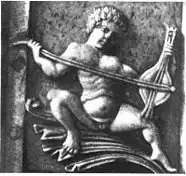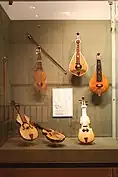lyra
See also: Lyra, lýra, and Lýra
English
Noun
lyra
- (anatomy, dated) The middle portion of the ventral surface of the fornix of the brain; so called from the arrangement of the lines with which it is marked in the human brain.
- 1840, Alexander Tweedie; William Wood Gerhard, A system of practical medicine: Volume 1, page 295:
- The vessels of the brain generally are often distended and gorged with blood, the lyra especially being fully injected.
-
Noun
lyra (plural lyras)
- A vertically suspended hoop used in acrobatic performances.
Etymology 3
Earliest known depiction of lyra (sense 1) in a Byzantine ivory casket (900 – 1100 AD). (Museo Nazionale, Florence)
Various models of the Cretan lyra (sense 2) at the museum of Greek traditional instruments, Athens.
From Ancient Greek λῠ́ρᾱ (lúrā) or Modern Greek λύρα (lýra). Doublet of lira, Lyra, and lyre.
Alternative forms
- lira (Byzantine lyra)
Noun
lyra (plural lyras)
- A bowed string musical instrument used in the Byzantine Empire.
- 2013, Howard Goodall, “The Age of Penitence, 1450–1650”, in The Story of Music, Chatto & Windus, page 55:
- A Persian scholar of the early tenth century, lbn Khurradadhbih, reported the lyra to be in widespread use throughout the empire, along with organs and bagpipes.
- 2019, Efthimios Bakarezos; Yannis Orphanos; Evaggelos Kaselouris; Vasilios Dimitriou; Michael Tatarakis; Nektarios A. Papadogiannis, “Laser-Based Interferometric Techniques for the Study of Musical Instruments”, in Rolf Bader, editor, Computational Phonogram Archiving (Current Research in Systematic Musicology), Springer, →ISBN, ISSN 2196-6974, LCCN 2018958359, page 257:
- The Cretan lyra is considered to be the most popular surviving form of the medieval Byzantine lyra, an ancestor of most European bowed instruments.
- 2021, Robert U. Ayres, The History and Future of Technology: Can Technology Save Humanity from Extinction?, Springer, →ISBN, page 72:
- The direct ancestor of all European bowed instruments is the Arabic rebab which developed into the Byzantine lyra by the ninth century and later the European rebec.
-
- A bowed instrument used in folk music in Crete, Greece.
- 1980, Margaret Anne Downie, “The Modern Greek Lyra”, in Journal of the American Musical Instrument Society, page 153:
- According to the Greek musicologist Fivos Anoyanakis, the piriform lyras of Crete have, at various times throughout history, been produced in different sizes and styles.
- 1988, Krētē: Monthly Publication of the Pancretan Association of America, page 10:
- Immediately after the ceremony, the wedding procession, accompanied by the lyra, lute (laouto) and songs, returns to the groom’s house […]
- 2019, Janet Sturman, editor, The SAGE International Encyclopedia of Music and Culture, SAGE Publications:
- In Crete, the lyra continues to be practiced.
- 2020, “Cretan Lyra”, in Andrew R. Martin and Matthew Mihalka, editors, Music Around the World: A Global Encyclopedia, ABC-Clio, →ISBN, LCCN 2019042636, page 207:
- Faithfully following the authentic local tradition, most lyras are entirely handmade.
-
Further reading
 Byzantine lyra on Wikipedia.Wikipedia
Byzantine lyra on Wikipedia.Wikipedia  Cretan lyra on Wikipedia.Wikipedia
Cretan lyra on Wikipedia.Wikipedia
Anagrams
- Lary, RYLA, Rayl, Ryal, aryl, lyar, ryal, yarl
Czech
Etymology
From Latin lyra (“a lyre, a lyric”), from Ancient Greek λύρᾱ (lúrā, “a lyre”).[1]
Pronunciation
- IPA(key): [ˈlɪra]
- Rhymes: -ɪra
- Hyphenation: ly‧ra
- Homophone: lira
Noun
lyra f
- lyre (ancient musical instrument) [19th c.]
Declension
Declension of lyra
| singular | plural | |
|---|---|---|
| nominative | lyra | lyry |
| genitive | lyry | lyr |
| dative | lyře | lyrám |
| accusative | lyru | lyry |
| vocative | lyro | lyry |
| locative | lyře | lyrách |
| instrumental | lyrou | lyrami |
Related terms
- lyrický
- lyrik
- lyrika
References
- "lyra" in Jiří Rejzek, Český etymologický slovník, Leda, 2015, →ISBN, page 391.
Anagrams
- ryla
Latin
Etymology
From Ancient Greek λύρᾱ (lúrā, “lyre”).
Pronunciation
- (Classical) IPA(key): /ˈly.ra/, [ˈlʲʏrä]
- (Ecclesiastical) IPA(key): /ˈli.ra/, [ˈliːrä]
Noun
lyra f (genitive lyrae); first declension
- (music) lyre, lute
- 8 CE, Ovid, Fasti 5.105-106:
- ‘septēna putāris, Plēiadum numerum, fīla dedisse lyrae’
- ‘‘you are thought to have given seven – the number of the Pleiads – strings to the lyre’’
(The muse Calliope credits Hermes/Mercury with inventing the lyre, and giving it seven strings to honor his mother Maia, eldest of the Pleiades (Greek mythology).)
- ‘‘you are thought to have given seven – the number of the Pleiads – strings to the lyre’’
- ‘septēna putāris, Plēiadum numerum, fīla dedisse lyrae’
- the northern constellation Lyra
Declension
First-declension noun.
| Case | Singular | Plural |
|---|---|---|
| Nominative | lyra | lyrae |
| Genitive | lyrae | lyrārum |
| Dative | lyrae | lyrīs |
| Accusative | lyram | lyrās |
| Ablative | lyrā | lyrīs |
| Vocative | lyra | lyrae |
Derived terms
- lyricen
- lyricus
- lyristēs
Descendants
- → English: Lyra
- Spanish: lira
References
- “lyra”, in Charlton T. Lewis and Charles Short (1879) A Latin Dictionary, Oxford: Clarendon Press
- “lyra”, in Charlton T. Lewis (1891) An Elementary Latin Dictionary, New York: Harper & Brothers
- “lyra”, in Harry Thurston Peck, editor (1898) Harper's Dictionary of Classical Antiquities, New York: Harper & Brothers
- “lyra”, in William Smith et al., editor (1890) A Dictionary of Greek and Roman Antiquities, London: William Wayte. G. E. Marindin
Norwegian Nynorsk
Noun
lyra f (definite singular lyra, indefinite plural lyrer or lyror, definite plural lyrene or lyrone)
- (pre-2012) alternative form of lyre
- definite singular of lyre
Swedish

lyra
Noun
lyra c
- a lyre (a stringed musical instrument)
- a European pollock (Pollachius pollachius)
- Synonyms: lyrtorsk, (regional) bleksej, bleka
- (brännboll) a catch without the ball having touched the ground
Declension
| Declension of lyra | ||||
|---|---|---|---|---|
| Singular | Plural | |||
| Indefinite | Definite | Indefinite | Definite | |
| Nominative | lyra | lyran | lyror | lyrorna |
| Genitive | lyras | lyrans | lyrors | lyrornas |
Derived terms
- a catch in brännboll
- enhandslyra
Anagrams
- ylar

